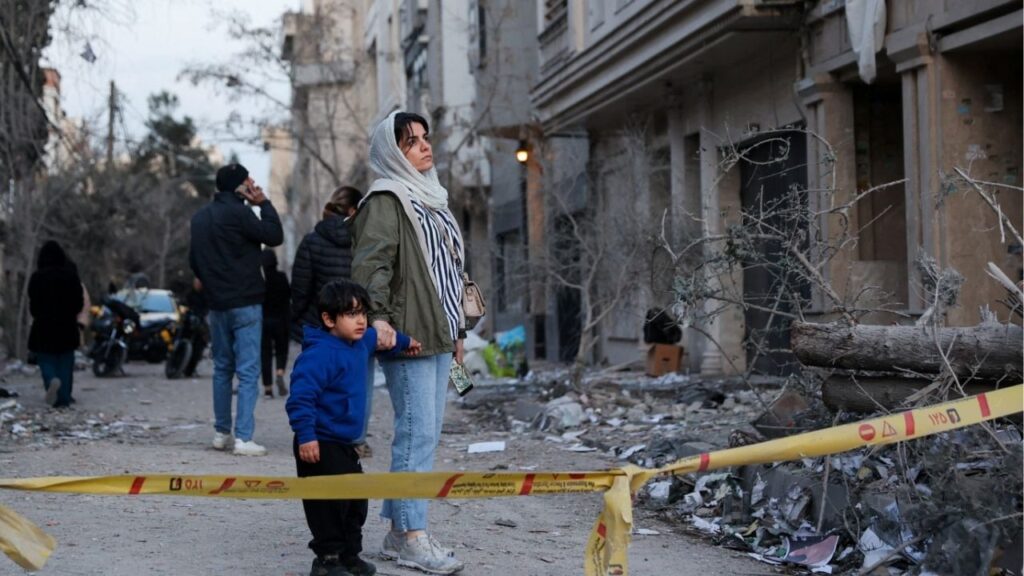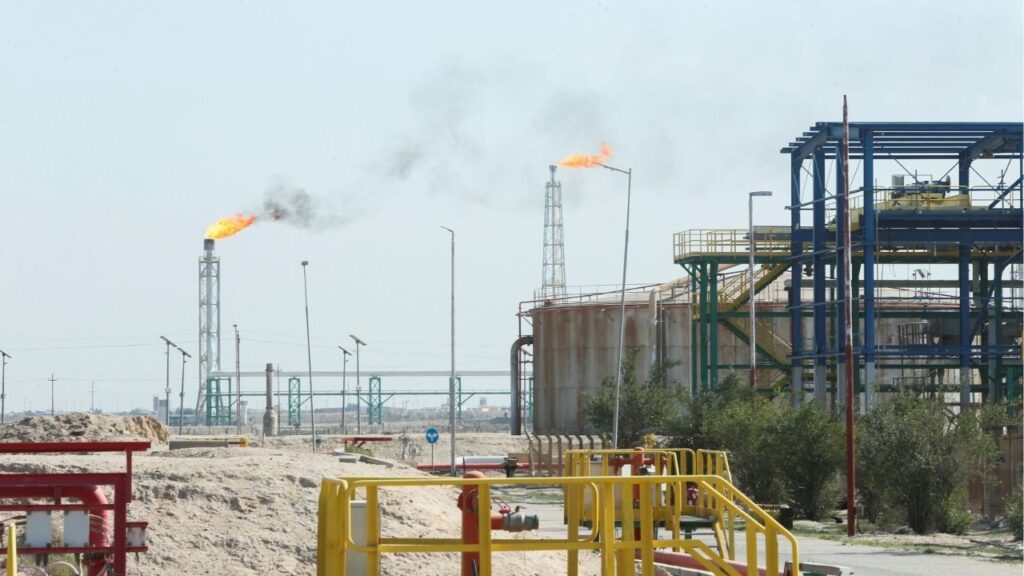Iranians gather in Tehran on Wednesday, July 31, 2024, after the assassination of Ismail Haniyeh, a top Hamas leader. Iran has vowed to retaliate for the killing of Haniyeh in an attack for which it has blamed Israel. (Arash Khamooshi/The New York Times)

- The killings of Hamas and Hezbollah leaders have heightened regional tensions and fears of broader conflict.
- Iran vows revenge for the assassination of Hamas leader Ismail Haniyeh, escalating regional instability.
- Global leaders push for de-escalation as fears grow of a wider war involving Israel, Iran, and Hezbollah.
Share
|
Getting your Trinity Audio player ready...
|
JERUSALEM — Less than a week after the killing of a top Hamas leader in Tehran, Iran, and a top Hezbollah commander in Beirut, the entire Middle East is on edge. Fears of a broader regional war have been mounting amid vows of revenge from Iranian leaders that have left Israel in a state of deep uncertainty.
Why Is an Iranian Attack Expected?
Iran has vowed to avenge the death of Ismail Haniyeh, a senior Hamas leader who was killed in Tehran after he and other leaders of Iranian-backed militant groups attended the inauguration of the new Iranian president. Israeli leaders would not confirm or deny whether their country was behind the breach of Iran’s defenses, but Iranian leaders and Hamas officials immediately blamed Israel and vowed retaliation.
Iran’s supreme leader, Ayatollah Ali Khamenei, issued an order for Iran to strike Israel directly, according to three Iranian officials briefed on the order.
And Iran’s Foreign Ministry spokesperson, Nasser Kanaan, said Monday that “Tehran is not interested in escalating the regional conflicts, but it is necessary to punish” Israel.
Related Story: Bomb Smuggled Into Iran Guesthouse Months Ago Killed Hamas Leader
How Is Lebanon Connected to the Crisis?
The killing of Haniyeh came just days after an Israeli strike in Beirut killed Fuad Shukr, a top-ranking commander of Hezbollah, the Iran-backed militia in Lebanon. That killing raised tensions that were already running high between Israel and Iran and its proxies in the region. The leader of Hezbollah, Hassan Nasrallah, said last week that its conflict with Israel had entered a new phase and threatened a major retaliation in response to the assassination.
Hezbollah has been engaged in tit-for-tat attacks with Israel for months, raising fears that the region was teetering toward a wider war. Hezbollah has fired thousands of rockets and drones at Israel, saying it was acting in solidarity with Hamas, which is also backed by Iran. Israel has retaliated and evacuated tens of thousands of its citizens in northern Israel near the border with Lebanon.
Hezbollah and Israel continued to trade cross-border fire Monday, with an Israeli airstrike killing two people in southern Lebanon, according to Lebanon’s Health Ministry. The attacks were not part of the major retaliation that Hezbollah has threatened, but civilians in Lebanon and Israel continue to brace for a potential all-out war.
The World Health Organization said Monday that it had delivered 32 tons of emergency medical supplies to Lebanon in case of a wider conflict.
Related Story: For Iran and Hezbollah, Calibrating Response to Israeli Strikes Leaves No Room ...
What Have Israeli Leaders Said?
Prime Minister Benjamin Netanyahu of Israel said Sunday that his country was “in a multifront war against Iran’s evil axis” and was “prepared for any scenario — both offensively and defensively.”
Netanyahu added, “I reiterate and tell our enemies: We will respond and we will exact a heavy price for any act of aggression against us, from whatever quarter.”
Israeli Defense Minister Yoav Gallant spoke with U.S. Secretary of Defense Lloyd Austin on Monday and briefed him on the Israeli military’s “readiness to defend Israel against potential threats posed by Iran and its proxies,” according to a statement by the Israeli government’s press office.
On Sunday, Gallant said at an Israeli base: “We are prepared very strongly in defense, on land and in the air, and we are ready to move quickly to attack or to respond. We will exact a price from the enemy, as we have been doing in recent days. If it dares to attack us, it will pay a heavy price.”
Related Story: Expert Warns Haniyeh Assassination Could Derail Ceasefire Talks, U.S.-Iran ...
What Diplomacy Is Going On?
With Iran and its proxies threatening an attack on Israel, frantic diplomatic efforts are underway to prevent a wider war.
President Joe Biden is expected to convene his national security team to discuss developments in the Middle East on Monday. He also is scheduled to speak Monday with King Abdullah II of Jordan a day after Jordanian Foreign Minister Ayman Safadi traveled to Tehran for meetings with his Iranian counterpart. Jordan is a close Western ally and helped intercept Iranian missiles and drones in April during a tit-for-tat attack between Iran and Israel.
U.S. Secretary of State Antony Blinken spoke Sunday with the foreign ministers of the Group of 7 major industrialized nations “to discuss the urgent need for de-escalation in the Middle East,” and the group “urged maximum restraint” to avoid further escalation, according to a statement by the State Department. Gen. Michael E. Kurilla, who leads the U.S. Central Command, is expected to arrive in Israel on Monday to complete coordination with the Israeli military in anticipation of a possible Iranian attack.
The Organization of Islamic Cooperation will hold a meeting of Arab and Muslim foreign ministers in Saudi Arabia on Wednesday to discuss “the continued crimes of the Israeli occupation,” including the assassination of Haniyeh, and Israel’s “aggressions” against Iran, the organization said in a statement.
Related Story: Bomb Smuggled Into Iran Guesthouse Months Ago Killed Hamas Leader
How Are Western Governments Advising Their Citizens in the Region?
Amid fears of a broadening conflict, the United States, Britain, Canada, France, Germany, the Netherlands, Ireland, Norway, Denmark, Belgium and Sweden were among the countries that urged their citizens over the weekend to leave Lebanon immediately.
France also urged its citizens in Iran to leave as soon as possible and to avoid travel to Israel or Palestinian territories. Canada urged Canadians on Saturday to avoid all travel to Israel because of “the unpredictable security situation.”
Several airlines had suspended or canceled flights to and from Beirut, and many flights were sold out. International airlines including Delta, United, the Lufthansa group and Aegean Airlines have also suspended flights to and from Israel. The flight disruptions have left many traveling Israelis unable to return home.
–
This article originally appeared in The New York Times.
By Hiba Yazbek/Arash Khamooshi
c.2024 The New York Times Company
RELATED TOPICS:
Categories

How the Iran War Is Choking Off the World’s Oil and Gas

Fresno Man Killed After Being Struck by Vehicle Identified


















